Reading - paper, digital, decline in teens, etc
> Dbislib
> Staff Resources
Is Google Making Us Stupid?
The process of adapting to new intellectual technologies is reflected in the changing metaphors we use to explain ourselves to ourselves.
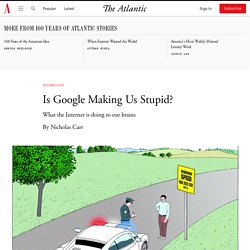
When the mechanical clock arrived, people began thinking of their brains as operating “like clockwork.” Today, in the age of software, we have come to think of them as operating “like computers.” But the changes, neuroscience tells us, go much deeper than metaphor. Thanks to our brain’s plasticity, the adaptation occurs also at a biological level. The Internet promises to have particularly far-reaching effects on cognition. When the Net absorbs a medium, that medium is re-created in the Net’s image. The Net’s influence doesn’t end at the edges of a computer screen, either. Never has a communications system played so many roles in our lives—or exerted such broad influence over our thoughts—as the Internet does today.
“Why Has She Stopped Reading?”\ud The Case for Supporting Reading for Pleasure in Secondary Schools. - CORE Reader. Does Reading Fiction Make Us More Empathic?
Teenagers aren't reading enough tough books – here's why that matters. We may be living in the digital age, but reading books is still a big part of growing up.
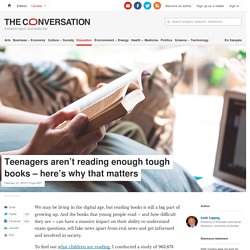
And the books that young people read – and how difficult they are – can have a massive impact on their ability to understand exam questions, tell fake news apart from real news and get informed and involved in society.
25 Ways Schools Can Promote Literacy And Independent Reading. 25 Ways Schools Can Promote Literacy Independent Reading contributed by Kimberly Tyson, Ph.D. In the age of the Common Core and its emphasis upon having students take on more challenging text, independent reading and student choice can easily take a back seat to the demands of increased rigor.
However, in a balanced literacy program, they remain important.
Progress in reading stalls at secondary school. It should be a priority. In his first major interview since being appointed education secretary, Damian Hinds set out his vision for the future schools.
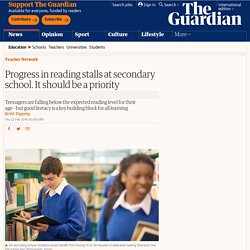
Raising school standards, teacher retention and school budgets are rightly top of his to-do list. But a new report has uncovered another challenge brewing in our classrooms. We have a persistent problem encouraging secondary school pupils to read challenging and age-appropriate books. The tenth annual What Kids Are Reading Report, which analysed the reading habits of almost one million school pupils from 4,364 schools that use the Accelerated Reader assessment programme, found that this is true across Britain and Ireland. The report revealed that progress made by pupils in primary school halts when they transfer to secondary school and, from then on, the gap between students’ reading ability and their age grows wider each year.
Of course, teachers are already under immense pressure to ensure the curriculum meets a range of competing demands.
How to Be A Teacher Reading Role Model – Without Actually Reading In Front of Your Class. Give older children story time to halt fall in young readers, urge experts. Experts have called on the government to make story time an intrinsic part of the school day for children right up to their teens, after two major new pieces of research revealed a decline in both the number of children being read to daily and the number reading for pleasure by themselves.
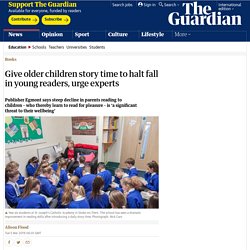
The findings of Nielsen Book Research’s annual survey into the reading habits of British children, to be revealed on Tuesday at an industry conference, show that only 32% of British children under 13 are read to daily by an adult, for pleasure, down four percentage points on the previous year, and nine percentage points down on 2012.
My Teen Doesn't Read! 9 Parent Ninja Moves. By Shannon Betts. This post originally appeared on A Fine Parent. “Mom, I have better things to do now.” When the conversation is about reading, few words cut a librarian to the quick more efficiently.
My 13-year-old son and I had first been talking about screen time limits. He had been expressing his thoughts calmly while I mentally congratulated myself on how I was handling this touchy conversation.
Scholastic Kids & Family Reading Report Home 2017. Impact-of-school-libraries-on-learning-2013. Reading for pleasure. Screen and Paper Reading Research – A Literature Review. OECD Reports Emphasise Reading Skills, Teacher Supply as Keys to Educational Success. 13/11/2002 - Reading skills are more important than ever for economic and social interaction in the modern world, and the availability of qualified and motivated teachers is a key factor in running a successful education system, according to two new publications from the OECD.
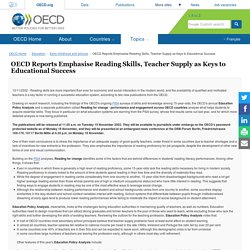
Drawing on recent research, including the findings of the OECD's ongoing PISA surveys of skills and knowledge among 15-year-olds, the OECD's annual Education Policy Analysis and a separate publication called Reading for change - performance and engagement across OECD countries analyse what helps students to acquire essential skills.
They focus in particular on what education systems are learning from the PISA survey, whose first results came out last year, and for which more detailed analysis is now being published. The publications will be released at 11.00 a.m. on Tuesday 19 November 2002. To obtain a password for the protected website, journalists should contact the Media Relations Division .
Your paper brain and your Kindle brain aren't the same thing.
Reading - paper versus digit versus audio





